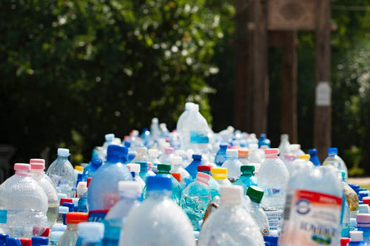
To mark World Water Day, McGill has announced that it will phase out the sale of single-use bottled water over the coming year. By May 1, 2019, non-carbonated water will no longer be sold in retail and vending machine locations on the downtown and Macdonald campuses. The University also plans to work with event organizers to reduce the use of bottled water at McGill events.
McGill’s self-operated and contract food service locations sell an estimated 85,000 bottles of water per year, and thousands more are distributed at on-campus events, including academic conferences and student orientation events. The waste generated by these single-use bottles worldwide is significant, as any recent video depicting the scourge of plastic waste accumulating in our oceans will tell you. In fact, every minute, 1 million plastic bottles are bought around the world, and the numbers are growing every day.
Leading the charge on the single-use water bottle ban is the McGill Office of Sustainability. Its Director, François Miller, explains why the University is focusing on bottled water and not simply banning all bottled beverages.
“We’re concentrating on bottled water for a few reasons. For one, we are incredibly fortunate here in Montreal to have safe, potable water provided by the municipality, which makes relying on single-use bottled water largely unnecessary,” said Miller. “Second, when you think about the amount of fossil fuels required to both produce and transport the bottles, drinking tap water is also a way to reduce greenhouse gas emissions.”
The University is committing itself to increasing its provision of safe, clean, and free water throughout its campuses by installing 25 additional water fountains (thanks to funding from the Sustainability Projects Fund). In addition, Le James, the McGill bookstore will begin selling a new line of affordable refillable water bottles in the coming months.
McGill students have long advocated for the banning of bottled water on campus. In fact, the Students’ Society of McGill University (SSMU) and the Postgraduate Students’ Society (PGSS) have both passed resolutions banning the sale of bottled water in retail locations they control, and both strongly discourage their student groups from relying on plastic bottles at events and meetings.
“SSMU recognizes the importance of preventing waste from plastic water bottles, as evidenced from the motion passed last October to eliminate the distribution of plastic water bottles during SSMU-affiliated events,” said SSMU Environment Commissioner Caroline Lou. “Students have been campaigning to ban plastic water bottles for years, and so I am glad McGill is addressing this crucial issue. This plan can pave the way for future waste-reduction initiatives, including the elimination of other disposable beverage containers, food packaging, and single-use cutlery.”
When asked what he thought of the bottled water ban, Prof. Joe Schwarcz, Director of McGill’s Office for Science and Society, replied emphatically, “I’m for it. I think that bottled water is an environmental disaster. While many people say that water bottles, typically made of polyester, are recycled, the statistics show that the majority of them end up in landfills. Shipping bottled water from Fiji or Europe makes no sense; it has a huge environmental footprint.”
He added, “There is nothing wrong with tap water [in Montreal]; it is widely tested. The bottled water industry has done a phenomenal job convincing consumers that its water is superior, that they should pay for a resource that is widely available for free, yet this is not scientifically justified. Bottled water is a marketing gimmick.”
For more information about the ban on bottled water, please visit mcgill.ca/sustainability.

It is nice that the office of sustainability is trying to make a difference, unfortunately plastic is one of the least of our concerns as North Americans. Because plastic pollution is easily visible to people, it is an easy target to rally around. In reality we should be putting our efforts into more impactful and worthwhile.
https://www.economist.com/news/international/21737498-so-far-it-seems-less-bad-other-kinds-pollution-about-which-less-fuss-made
This is a great initiative! I am happy McGill will be enforcing this new policy. I am wondering though why not ban the sale of other plastic bottled beverages in vending machines? By removing bottled water, people can still (and will likely buy more of) carbonated beverages, or vitamin waters – essentially bottled water but with the addition of various chemicals and sugars. Understandably, encouraging people to drink tap water is beneficial, but only if you also remove the various other (and detrimentally worse, both on physical and environmentally health) bottled beverages that will still be on sale. I hope… Read more »
This will probably have a net effect of increasing the sale of soft drinks containing lots of sugar, salt and other interesting food chemicals. Banning all bottled drinks, as has been suggested, is obviously not practical. Not everyone can carry three bottles of liquid with them all the time… Then there is the problem of “democracy”. Even if the majority of the university population is in favor of this new rule (is this really true? has there been a proper study of attitudes? did the report get past impartial reviewers?), should a majority have the power to oppress a minority… Read more »
@robert I doubt that what your say will happen actually will. If water is your drink of choice, it’s highly unlikely that you would turn to soft drinks. People will likely carry their own bottles. You don’t need three – when your bottle is empty, just refill it at a water fountain . Plus, you get to bring a bottle that allows you to regulate the temperature of your drink . As for the polling, it is my experience that people don’t vote when given the option.